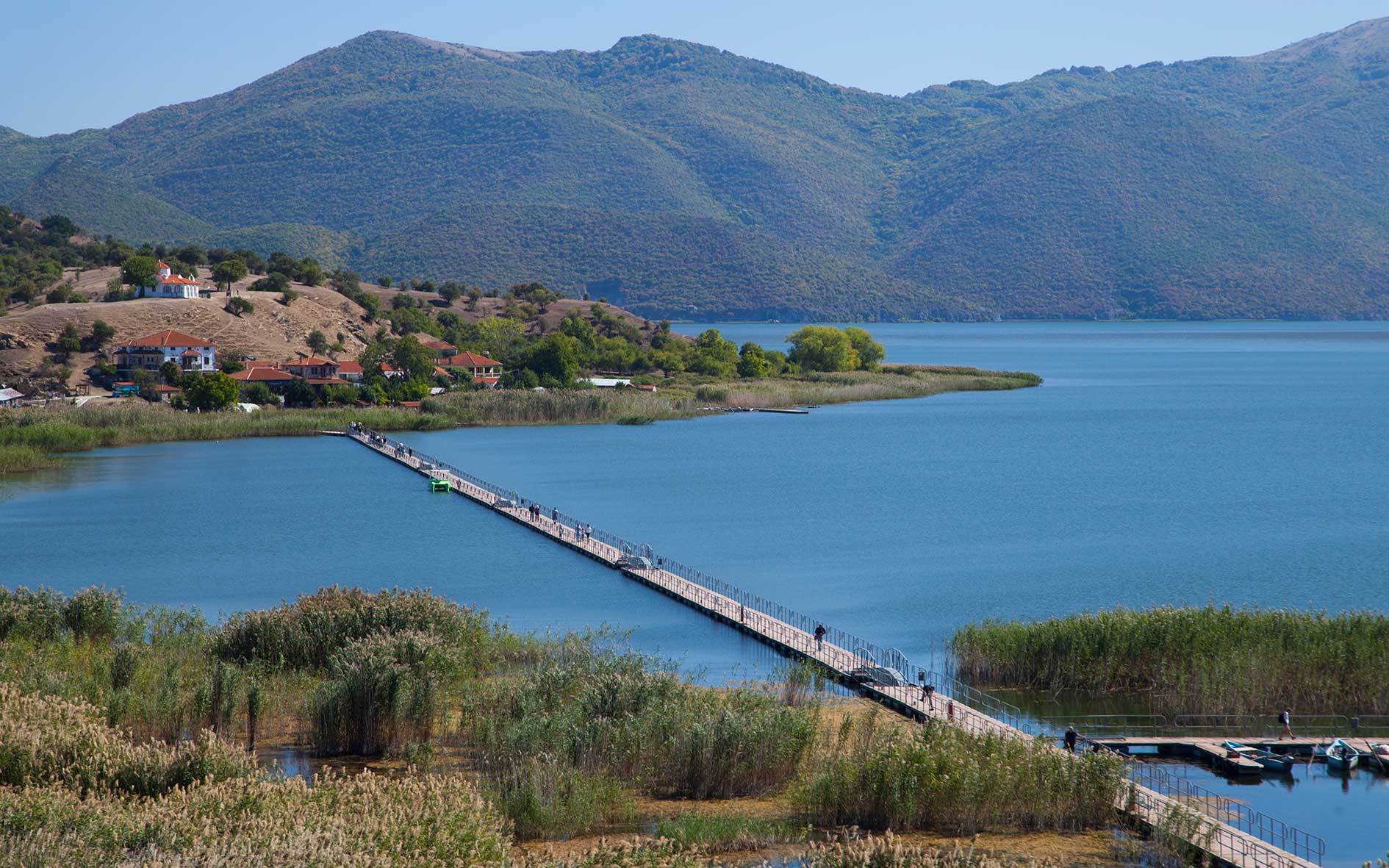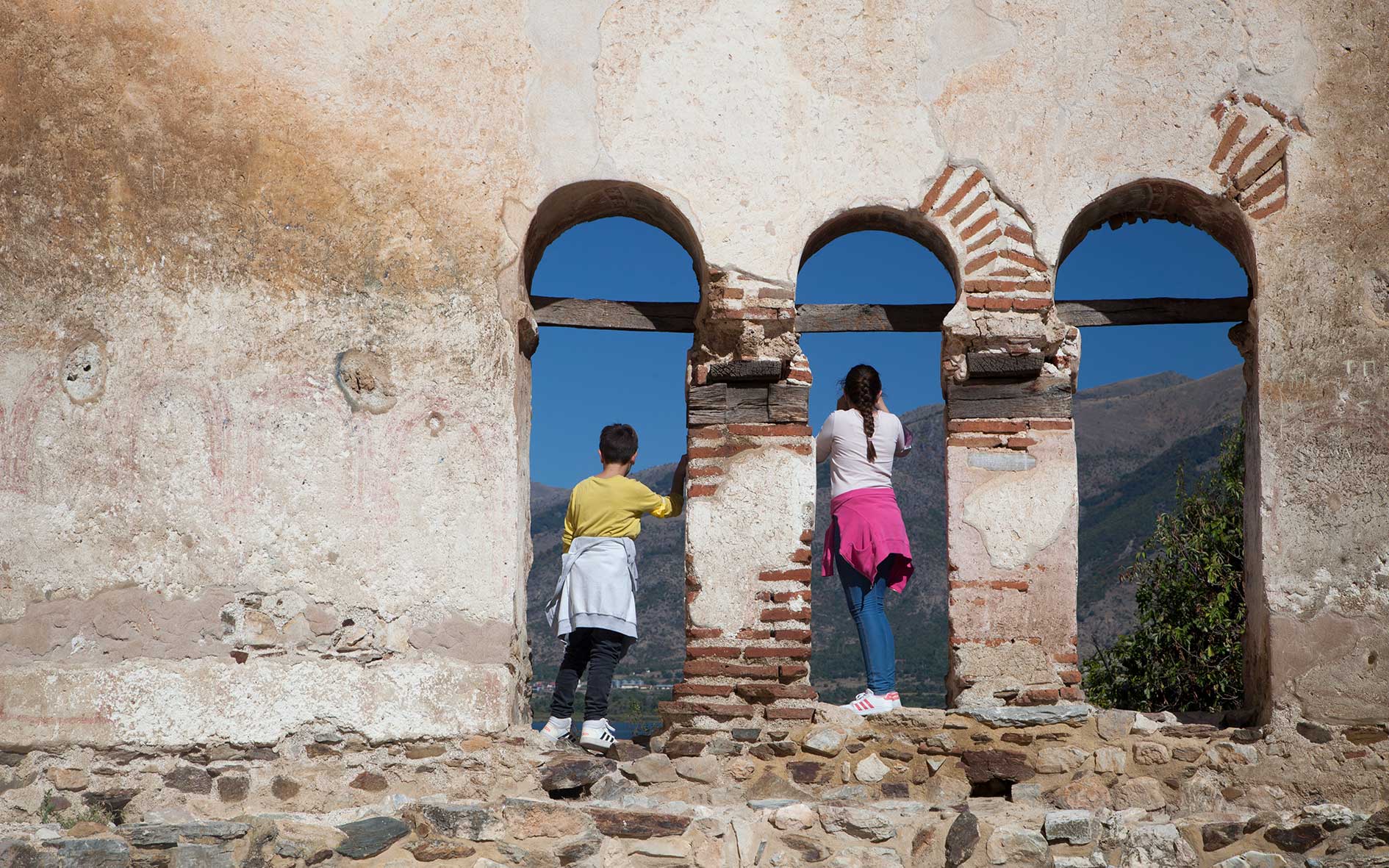Prespa: The secrets of Aghios Achillios

The pontoon bridge that will take you to Aghios Achillios, the tiny island in Mikri Prespa Lake, is 650m long. Walking to the island is like a rite of passage, and a memory from Prespa and from the borders of Greece, Albania, and North Macedonia that lasts a lifetime.
The bridge was built in 2000. Before then, according to the stories we heard from the few inhabitants of the island, you could only get there by boat or by walking on the ice in the winter. We were also told about the legend of the eleven houses, according to which if a twelfth house was ever to be built, another house in the settlement would collapse and about the Prespeia Festival, the summer event that takes place in the mystic landscape of Aghios Achillios. They also shared stories from their everyday life, such as incidents of bears coming at night to the garbage cans, in the parking lot of the opposite shore, looking for food, and about the sharp metal parts on the bridge that have been specially designed to hurt the bears’ feet, in order to prevent them from crossing over to the island. Of course, they also told us about their Saint, Aghios Achillios (Saint Achilles), whose basilica is one of the most charming monuments in Greece, despite its dilapidated appearance.

The three-dimensional rendering of the monument was realized through an augmented reality application that was presented and released to the public just three weeks ago, at a conference held in Prespa in the context of the Holywater project (implemented under the cross-border program Interreg IPA CBC Greece – North Macedonia). The project was created by 3D-developer and designer Stefanos Oikonomou, under the scientific supervision of architect Achilleas Stoios-Christopoulos and archaeologists of the Ephorate of Antiquities of Florina Andreas Tsokas and Dimitris Asimakopoulos.
It is indeed impressive to see what this particular church once looked like, both externally and internally. It is thought to have been built in the 10th century by the Bulgarian Tsar Samuel, who had established the center of his kingdom in Prespa. Inside it, he had placed the remains of Aghios Achillios, which he had taken from Larissa. However, recent research by Tsokas and Asimakopoulos indicates that this story may not be true at all – and so the mystery deepens. The only part of the structure that survives today is the niche of the sanctuary with three windows and some stone piers with adobe decorations.
It will not take you more than two hours to tour the island, which is dotted with numerous interesting churches, all while enjoying absolute peace, thanks to no vehicles being allowed.
First, you’ll see the church of Aghios Georgios, dating back to the 15th century, then the basilica of Aghios Achillios. Next, you will reach the beautiful 16th century church of Panagia Porphyra with its exquisite frescoes. Then, if you take the circular route to go back, you will pass by the ruins of the churches of Aghios Dimitrios (14th century) and the Twelve Apostles (11th century). In the latter, you may also spot the ancient remains, the only ones in the whole area of Prespa that are said to have belonged to a sanctuary dating back to the Hellenistic Period.

You will walk by reedbeds, great for birdwatching, and it’s also worth climbing to the top of the hill with the huge cross, or to the smaller one by the modern church of Aghios Achillios, to see Mikri Prespa from above and the panorama of the surrounding mountains.
The small settlement is currently inhabited by 26 people, five of whom are children (all boys). A few goats, hens and lazy cats also roam among dilapidated houses and modern constructions. From here, you can take the municipality’s solar powered boat for a delightful tour in Mikri Prespa Lake.
Alternatively, you could sit at the taverna of the Aghios Achillios Guest House (Tel. (+30) 23850.466.01) to taste the local cuisine including buffalo meat, butter beans, pepper pie, common carp from the lake and kebabs seasoned with chili flakes. Always pair your meal with local tsipouro (a pomace brandy) without anise and with endless stories from the locals, mainly about their special cohabitation with wildlife.
This article first appeared in Greece Is (www.greece-is.com), a Kathimerini publishing initiative.





